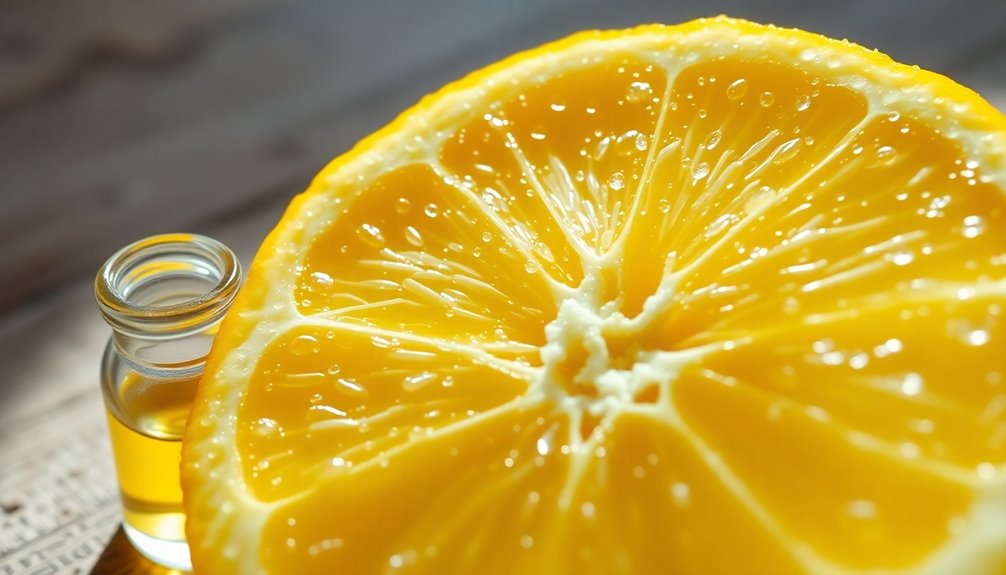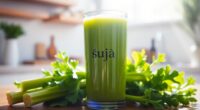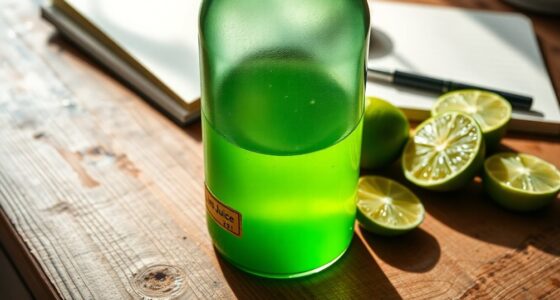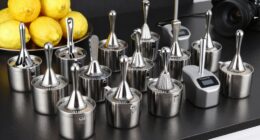You can expect about 1½ tablespoons of juice from half of a medium lemon and around 2 tablespoons from half of a large lemon. If you're planning a recipe, knowing these amounts helps you get the right flavor without running short. Freshness and ripeness can also influence the yield, so choose lemons wisely. Want to know more about maximizing juice and planning your recipes? Stick around, and you'll uncover some useful tips!
Key Takeaways
- Half of a medium lemon typically yields about 1½ tablespoons of juice.
- Half of a large lemon can produce around 2 tablespoons of juice.
- Juice yield can vary depending on the lemon's size and ripeness.
- Warming lemons before juicing can help increase the juice yield.
- Understanding juice yield aids in precise measurements for recipes.
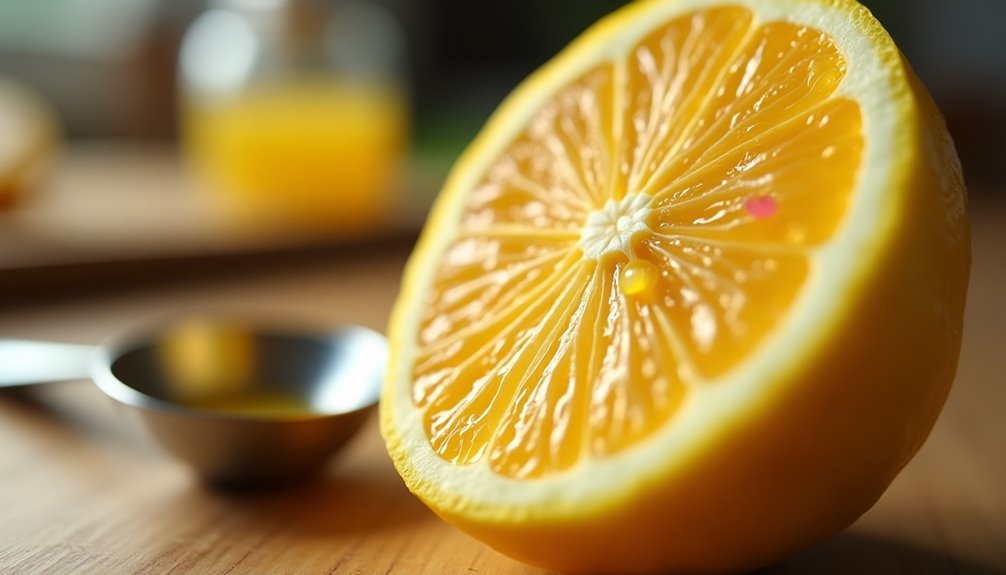
When you squeeze a lemon, you can expect to get about 2 to 4 tablespoons of juice, depending on its size. If you're using a medium lemon, you're likely to yield around 3 tablespoons, while a large lemon can produce up to 4 tablespoons, or even a quarter cup of fresh lemon juice. Knowing how much juice you can extract from a lemon helps you plan recipes more effectively, ensuring you have the right amount of juice for whatever dish you're preparing.
If you're working with half of a lemon, the juice yield decreases. A half of a medium lemon typically gives you about 1½ tablespoons of juice, while half of a large lemon can yield around 2 tablespoons. This information's handy when you need just a little bit of juice for dressings, marinades, or even cocktails. It allows you to gauge how many lemons you might need based on your desired amount of juice.
When you're diving into recipes that call for lemon juice, it's essential to understand how many lemons you'll need to achieve the right amount. For instance, if you require ½ cup of lemon juice, you'd need about 3 medium lemons or 2 large lemons. This is a crucial detail to keep in mind when grocery shopping or planning a meal. You wouldn't want to find yourself short on the fresh lemon juice needed for a zesty dessert or a refreshing beverage.
The average yield from a whole lemon varies based on its size and ripeness. A perfectly ripe lemon usually has more juice than one that's a bit under-ripe. If you're squeezing a lemon and notice that the juice flow isn't as robust as you'd like, consider warming the lemon in the microwave for 10-20 seconds before juicing. This simple trick can significantly increase the juice yield, allowing you to get more juice from that squeezed lemon.
Understanding how much juice you can get from lemons also enhances your overall cooking experience. Whether you're making a lemon vinaigrette, adding zest to a cake, or whipping up a citrusy cocktail, knowing the juice yield lets you measure accurately. Fresh lemon juice is often the star of the show in many recipes, and getting the right amount can elevate your dish, making it taste vibrant and fresh.
In addition to using the right number of lemons, consider the quality of the lemons you're using. Fresh, juicy lemons will always give you better results than older ones that may have dried out. So, when you're out shopping, look for lemons that feel heavy for their size and have a vibrant yellow color. This way, you can ensure you're maximizing the amount of juice you get from each lemon, whether it's a medium lemon or a large lemon.
Frequently Asked Questions
How Much Juice Does 1 2 Lemon Make?
If you're wondering how much juice you can get from half a lemon, it typically yields about 1½ tablespoons if it's a medium lemon.
If you've got a larger one, expect closer to 2 tablespoons.
Smaller lemons might only give you around 1 tablespoon.
How Many Teaspoons Is the Juice of Half a Lemon?
When you squeeze half a lemon, you can expect to get about 1. 5 tablespoons of juice, which equals 4. 5 teaspoons. This means that if you’re cooking or baking and a recipe calls for lemon juice, knowing how much juice you can extract from one lemon can significantly aid in your measurements. For those curious about how much juice from one lemon is typical, it can vary slightly depending on the lemon’s size and freshness. Generally, a medium-sized lemon will yield around 3 to 4 tablespoons of juice, making it a worthwhile addition to your culinary endeavors.
If you're using a larger lemon, that amount might increase to around 2 tablespoons or 6 teaspoons.
Just remember, the juice yield can vary based on the lemon's size and ripeness.
Can I Use Bottled Lemon Juice Instead of Fresh Lemon?
Isn't it funny how bottled lemon juice claims to be just as good as fresh? You can use it, but expect a different experience.
Fresh lemon juice brings vibrant flavor and aroma, enhancing your dishes. Bottled juice, on the other hand, might taste more tart or lack that zest you crave.
If you go for the bottled option, adjust the amount to suit your taste, but be prepared for a less lively result.
How Much Real Lemon Juice Is Equal to the Juice of One Lemon?
To find out how much real lemon juice equals one lemon, you can estimate that a medium lemon typically produces about 3 tablespoons of juice.
If you're using a larger lemon, you might get around 4 tablespoons. Always measure according to the lemon's size for accuracy in recipes.
Conclusion
In the grand scheme of culinary wonders, squeezing just one lemon can feel like unlocking the secrets of the universe! You might get about 2 to 3 tablespoons of zesty juice—enough to supercharge your favorite dishes or turn a dull drink into a citrus explosion! So, next time you're wondering how much juice is in that little fruit, remember: it's not just lemon juice; it's liquid sunshine, ready to elevate your cooking to legendary status!
Cindy thoroughly researches juicing trends, techniques, and recipes to provide readers with practical advice and inspiration. Her writing style is accessible, engaging, and designed to make complex concepts easy to understand. Cindy’s dedication to promoting the advantages of juicing shines through her work, empowering readers to make positive changes in their lives through the simple act of juicing.

